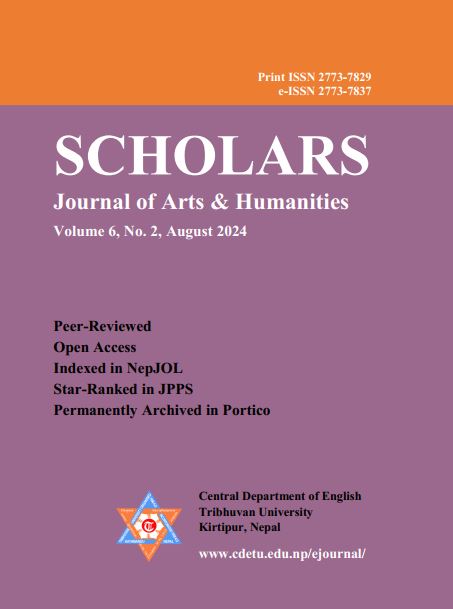Balkrishna as a Hindu Reformist in Narayan Dhakal's Pretkalpa (The Age of the Dead): A Critique of New Traditionalism
DOI:
https://doi.org/10.3126/sjah.v6i2.68740Keywords:
Hinduism, reformation, modernity, new traditionalismAbstract
This paper examines reformation in the Nepali society as represented in Narayan Dhakal's novel Pretkalpa (The Age of the Dead). The novel advocates social reform in the Hindu society as modernity in Nepal during the early decades of the twentieth century. The paper hinges on the following research questions: How are modernity and reformation connected? To what extent does social/religious reformation contribute to modernity? Under the influence of reformist ideas from Dayanand Saraswati's Satyārtha Prakāś (The Light of Truth), Balkrishna, the protagonist of Dhakal’s novel – a Kashi educated Brahmin pundit – leads a series of reformation initiatives to change discriminatory practices across the lines of caste, gender, and class. To examine his reformist initiatives based on the Vedic knowledge, this paper recontextualizes Subir Sinha et al.'s critique of the discourse of new traditionalism in relation to the politics of development and environmentalism in India. Threatened by the reformation efforts of Balkrishna, the state – under the leadership of Chandra Shamsher – does everything it can do to retain the orthodox Hinduism, casteism, and feudalism. Eventually, the feudal Rana system based on the practices like cākarī and caplusī (sycophancy and flattery) prevails, exposing the vulnerability of new traditionalism and thereby of the conservative modernity as well. Discussing modernity, reformation, and new traditionalism, and their connections between and among them to analyze the novel, the paper foregrounds new traditionalism as a significant concept to examine modernity in Nepal.
Downloads
Downloads
Published
How to Cite
Issue
Section
License

This work is licensed under a Creative Commons Attribution 4.0 International License.
© Central Department of English, Tribhuvan University and Authors




